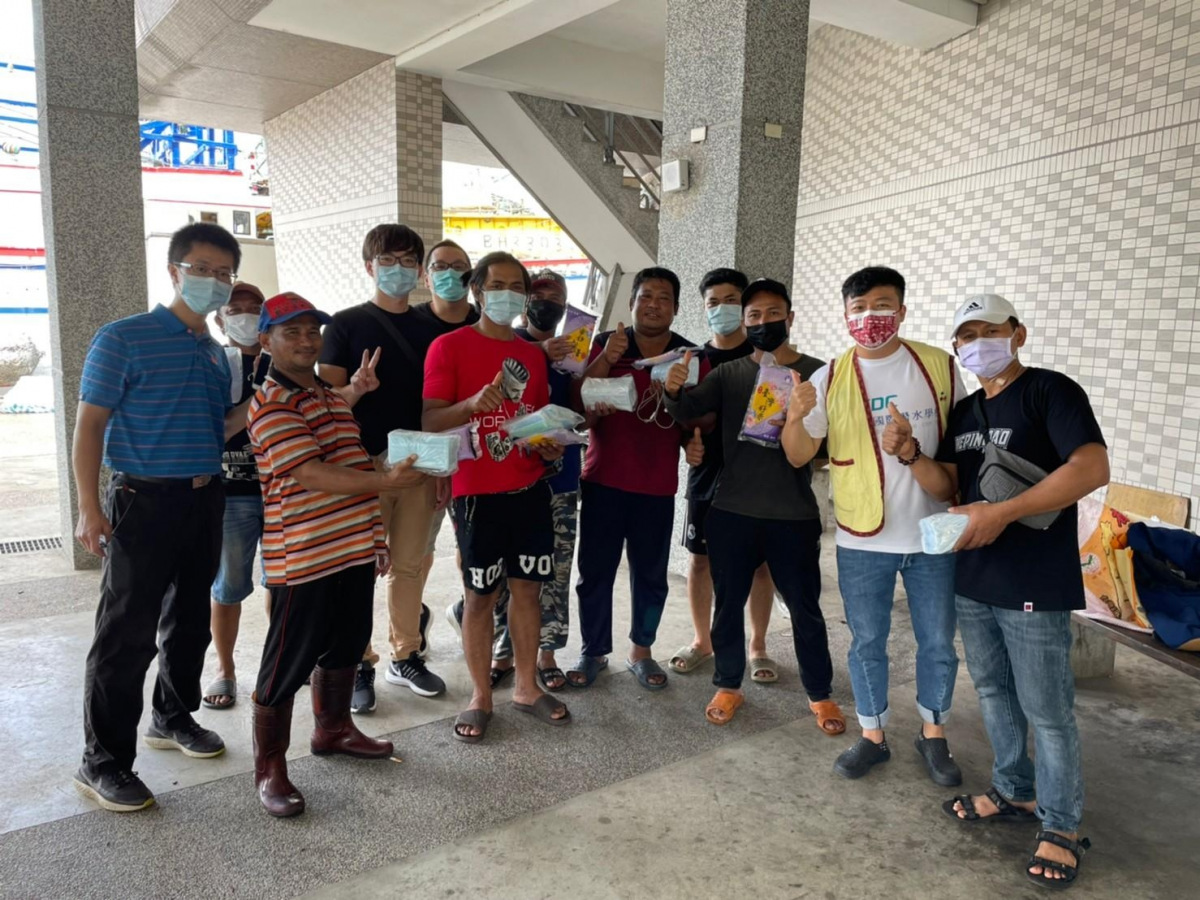 After the typhoon, although it was still pouring rain in the morning, when we arrived at the fishing port, a little bit of warm sunshine gradually appeared in the sky. Rerum Novarum Social Service Center and the Department of Environment and Occupational Medicine of National Taiwan University provided free clinics for foreign fishermen at the port and other service like health checks and occupational injury promotion for workers.
After the typhoon, although it was still pouring rain in the morning, when we arrived at the fishing port, a little bit of warm sunshine gradually appeared in the sky. Rerum Novarum Social Service Center and the Department of Environment and Occupational Medicine of National Taiwan University provided free clinics for foreign fishermen at the port and other service like health checks and occupational injury promotion for workers.
When the operation service team car entered the fishing port, some fishermen were resting at the port. After communicating and expressing our intention, the fishermen sat down one by one and waited for the doctors to conduct health checks for them.
During the inspection, the doctors not only measured the height, weight and blood pressure of the fishermen, but also inquired about the fishermen's living habits and work on the fishing boat to identify whether it will cause much damage to the body over a long period of time or even occupational accidents.
For example, when a fisherman describes his thigh pain, the doctor asked in detail, such s which foot hurts, how often it hurts, when it hurts, what position it hurts, and so on. For the fishermen, these injuries may only be a little sore, or they may affect his movements during work, but all these pains have one thing in common—the fishermen did not go to the doctor. There are many reasons. It may be that the fishermen think that these do not affect their lives and do not need to see a doctor; it may also be that they are hindered by language problems when seeking medical treatment on their own; it is more likely that the fishermen are expressing their bodies to their employers. When he was in pain and hoped that the employer would take him to the doctor, the employer kept delaying until the fisherman did not go to the doctor in the end. However, these injuries may gradually form an occupational disaster unconsciously, but by that time the body has often been seriously injured, and even irreparable.
During the diagnosis and treatment, we asked questions about occupational accidents, and some fishermen also explained to us the injuries suffered by their own bodies. Some fishermen were amputated because their fingers were accidentally caught in the fishing line when they were throwing fishing lines on the fishing boat; some fishermen fell down on the boat and leave a obvious scars; one water lamps on fishing boats can illuminate an entire basketball court, but in order to illuminate the fish in the sea, a boat is often equipped with more than a dozen water lamps. Under such severe light stimulation for a long time at night, fishermen’s eyesight was gradually affected, and some fishermen also said that their eyesight was damaged.
Some people may wonder whether foreign fishermen are labor. However, in fact, the fishermen hired by Taiwanese employers are protected by the Labor Standards Law and can be covered by labor insurance. Therefore, in the event of occupational disasters, they can apply for occupational disaster benefits or even disability benefits in the same way as Taiwanese people. However, these fishermen may do not know these right that they can enjoy, and there's no one going to tell them.
On fishing boats, it may take several weeks or even months for the fishermen to leave the port at a time. After returning to the fishing port, they are busy unloading the cargo and arranging the fishing gear. Such laborious work actually requires a strong body and a healthy mind to cope with. Fishermen may seem like they have nothing to do with us, but they may actually exist around us, living with us in the community. Let's pay more attention, be less discriminatory, and get to know these people better together.
In the long run, the fishermen is a group who has been ignored. In 2017, Rerum Novarum reach these people. We not only concern about their lives but help them solve the problem about regulation, salary payment, job accident, employers changing, human trafficking, and so on. We went to 21 ports and solve the practical problems of the fishermen. Due to the language barrier, we see many fishermen do not know how to ask for help and bear the difficult working environment instead. They are working day and night with the thin salary. We are looking forward to your help and hope your can be the protector for the foreign migrants. Press “I want to donate.” or call (02)2397-1933 #122. Thanks for your attention!